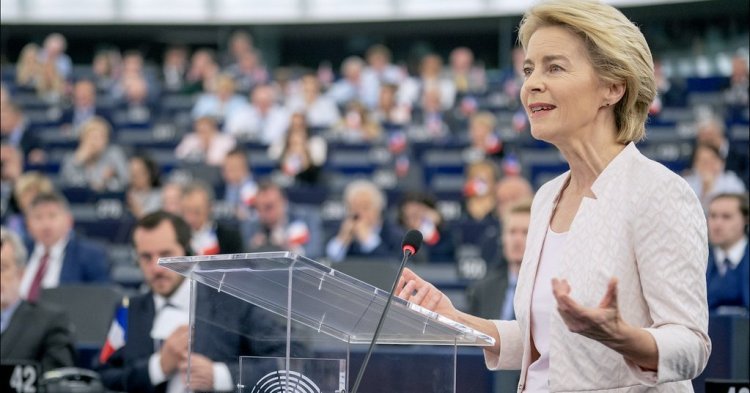
Climate Emergency and Energy - Théo Boucart
Translated by Niamh Perry
Just like under Jean-Claude Juncker, climate protection and the European energy transition are priorities for Ursula von der Leyen’s new Commission. Full implementation of the Paris Climate Agreement is necessary to limit global warming to “well below 2°C – preferably 1.5°C”. The EU ratified the treaty in October 2016 and must, therefore, apply the rules.
Although the Juncker Commission adopted the energy union in 2015 – which provides a coherent framework for the implementation of climate and energy policy at European level – many countries, including France and Germany, are likely to miss their 2030 climate targets. Although EU countries have long pioneered the development of new low-emission technology, they are now being overtaken by other countries, such as China and the US. A comprehensive industrial policy, which is necessary to drive the green technological revolution forward, is still lacking. Green investments under the so-called Juncker Plan are still fairly tentative. The EU’s climate change policy still has many contradictions.
How could this be changed? In her speech, shortly after her formal appointment as the new President of the EU Commission, Ursula von der Leyen presented an ambitious plan on climate protection to MEPs. The main objective for the former German Federal Minister was to make Europe the “first climate-neutral continent in the world”. It is hoped that this goal will be achieved through raising the EU emission reduction target for 2030 from 40% to “at least 50%”, implementing a “comprehensive plan to increase […] toward 55%” by 2021, and establishing a “climate bank”.
The Vice-President of the Commission, Frans Timmermans, will have to propose a concrete climate package within the first 100 days in office. The Green Deal proposed by Ursula von der Leyen could, therefore, be a huge opportunity for a continent on the verge of another recession. Such structural change is our last chance to boost an environmentally friendly, forward-thinking and competitive European economy.

Social Europe - Guillermo Íñiguez
Article 3(3) of the Lisbon Treaty claims that the EU ‘shall establish … a highly competitive social market economy, aiming at full employment and social progress’, to ‘combat social exclusion and discrimination’.
Whatever Juncker’s success in other areas, he has failed at developing Social Europe. There are, of course, many reasons for this. One of them is structural – Social Europe lacks the legal strength to be properly implemented, with most relevant competences being in the hands of Member States. But he has, at best, shown lack of leadership (for example, on the question of fiscal harmonization) and, at worst, played a key role in imposing reckless austerity which had a devastating impact on Southern Europe’s social fabric.
The global economic context hardly looks promising for von der Leyen. Yet the confidence she was narrowly granted by the European Parliament was based on strong social commitments which she will have to honour.
The task ahead is not easy. It requires apologizing for the damage inflicted by austerity and deepening the EMU through a common (expansive) fiscal policy. It requires the introduction of a harmonized minimum wage which improves social cohesion. It requires an ambitious strategy which fights social exclusion – for example, through a Universal Basic Income. And underlying all of this, it desperately needs a Green New Deal which paves the way for an environmental and economic transition. In other words, the von der Leyen Commission has to draw new social contract – one which reminds citizens that the European project is not a mere economic union, but, as Article 3 lays out, a deeply social one.
The EU, as it currently stands, lacks many of the legal instruments to carry this out – and its budget, which equals 1% of Gross National Income of the 28 member states, is nowhere near enough. With a Conference for the Future of Europe around the corner, there can be no excuses. As von der Leyen herself said earlier this week, Europe has been at its best when it has been at its boldest. It is high time for this to translate into tangible social policy.

Corporations and Tax - Madelaine Pitt
Trying to impose the world’s biggest ever corporate fine is bound to earn you a few headlines - and enemies. Margrethe Vestager, the European Commissioner for Competition since 2014, will have the chance to continue with a similar department - or “portfolio” to borrow Commission jargon - under von der Leyen’s leadership. This is both an endorsement of her work and a testimony to her dedication to the cause of trying to force big companies to pay their fair share of corporate tax.
The legal cases which made her probably the most famous of the outgoing commissioners are not over, nor are the problems she fought solved. Her attempt to make Apple to pay €14 billion in lost tax revenues to Ireland resulted in the bizarre situation of the California-based company trying to avoid paying the money and the Irish government trying to avoid receiving it. Ireland, which reaps huge benefits from charging one of the lowest corporate tax rates in the EU (12.5%), and whose rules allowed Apple to avoid even this low rate and pay just €50 for every million in profit, does not wish to see the EU meddle in what it considers its domestic affairs. European courts are yet to deliver a final judgement.
Other low-tax countries like Luxembourg have trampled on efforts to increase transparency with regard to where and how much multinational companies pay in tax (Juncker himself was involved in this whilst still Prime Minister of Luxembourg). Tax does not figure among the EU’s competencies, leaving member states free to set their own. Yet leaving fiscal policy entirely unfettered within a single market where goods and services can be traded freely throws up some severe inconsistencies.
The basis of Vestager’s argument was that unpaid tax amounts to state aid, giving Apple an unfair advantage over other companies, and therefore falls within her remit as Competition Commissioner. However, this is a wider issue of social justice and Vestager undoubtedly sees it as such. The upcoming legal judgements will be a marker of how successful she has been in demanding multinationals such as Apple contribute to the societies they operate in and dictate her next moves for her new mandate.
Brexit - Aimee Pearcy
Brexit has been a thorn in the side of European politicians since 52% of UK voters decided that they wanted Britain to leave the EU on the 23rd June 2016.
Juncker made his position on Brexit quite clear during a European Parliament debate in October when he told MEPs that dealing with Brexit throughout his five-year mandate had been a “waste of time and a waste of energy”. During the negotiation phase he showed exasperation about the UK’s very woolly negotiating position and has been frustrated with unrealistic UK proposals which would undermine the single market.
Von der Leyen has made her disappointment about Brexit clear. She has told MEPs that she hopes the UK abandons its plans to leave the EU and appears especially opposed to a hard Brexit, which she has stated would have “massively negative consequences” for both Britain and the EU.
Following the acceptance of the UK’s request for a “flextension” until 31 January 2020, she has written to British Prime Minister Boris Johnson to remind him that it is his duty to put forward a British candidate to be the country’s EU commissioner as soon as possible. As part of her bid to have a more equally gender-balanced commission, she has increased the pressure on Johnson further by suggesting that the UK puts forward women for the role. However, Johnson has refused to cooperate, leading the EU to launch legal proceedings to failing to abide by the treaties.
“Brexit, should it happen, is not the end of something but the beginning of our future relationship,” von der Leyen has said. If Brexit does go through, the new President of the European Commission has stated that it is in the interests of both sides to reach an agreement. However, she has also insisted that the EU is fully prepared to cope with the impact if Britain crashes out without one.

Digitalisation - Julia Bernard
Hardly anything influences modern society as much as the development of new technologies. Accordingly, the Juncker Commission anchored digital issues in its top priorities at the start of the mandate 5 years ago. Their challenging task was to create a digital single market in which the 28 national digital markets would merge.
The controversial General Data Protection Regulation, the GDPR, which was adopted in 2016 and came into force in 2018, is a law on data privacy and is regarded as a first step towards adaptation to the digital age. The copyright reform in April 2019, which among other things obliges platforms to pay fair royalties to their authors, led to heated debates. The end of roaming charges was an extremely popular development amongst European citizens yet showed how the reluctance of Member States can be a further obstacle to a true single digital market.
Even though it was initiated before Juncker’s mandate, the adoption of “open internet” regulation in 2016, must be mentioned. In forbidding discrimination in internet traffic, the law contributes to “net neutrality” - undoubtedly one of Europe’s most important challenges today.
What Juncker is passing on to von der Leyen? The new Commission will try to further develop strategies in the field of artificial intelligence and the implementation of 5G - even though important initiatives have already been launched, these “megatopics” remain on the table.
Margrethe Vestager, the new Commissioner for Digitisation and Competition, promised a “Europe [that is] fit for the digital age”. The fact that she, as one of the new Vice Presidents, will be taking care of this portfolio shows the importance of the issue. Vestager equally wants to improve in the field of artificial intelligence, digital sovereignty being the ultimate goal. On the way to a strong Europe in the digital field, priority will be given to a policy that promotes technological innovation, joint industrial projects and higher barriers to unfair competition.
Lastly, it should not be forgotten that the ultimate capacity to act will also depend on the resources allocated via the multiannual financial framework.

EU-US Relations - David Fernandéz
The creation of the European Coal and Steel Community at the very beginning of the European project was in part thanks to the US, which urged European countries to unite to face off Soviet troops across the Iron Curtain. Accordingly, the US-EU relationship has always been a key aspect of the EU’s foreign policy.
No Commission until Juncker’s had had to face up to an actively hostile American foreign policy. Since coming to power in 2017, Trump has publicly criticised the European Union, endorsed Brexit, complained of the EU’s unfair trading practices and complained about Europe’s under-financed defence. On trade, the Juncker Commission’s response to the US tariffs on various goods, on the basis of Europe’s supposed dumping, has been sterner than expected. The EU has responded in kind, targeting goods from politically relevant states like Florida.
However, in no area have the new US-EU relations led to a more radical departure from the status quo than in defence policy. While previous US presidents have asked EU NATO members to increase defence spending to 2% of their GDP, Trump has demanded 4%. In response, the Juncker Commission developed an ambitious overhaul of Europe’s Common Defence and Security Policy, developing a common procurement system (European Defence Funds).
The key question for the future of EU-US relations is whether the United States can be a dependable ally. That question will remain even if Trump is not re-elected. Ursula von der Leyen, owing to her own background as defence minister, seems likely to continue down the path set by her predecessor, furthering defence integration and responding tit-for-tat to US protectionism. That is, to the degree that national capitals will allow; Warsaw and Budapest favour closer relations with the current White House.

Rule of Law - Flavia Sandu
While Ursula von der Leyen finally has a complete team for the Commission (discounting the absence of a UK commissioner), there were a few stumbling blocks along the way. Three candidates were rejected by the Parliament after individual hearings, including the Hungarian candidate László Trócsányi. Hungary is perhaps the most infamous country in terms of rule of law, with the super-majority held by the ruling party Fidesz allowing it to make controversial constitutional changes and submit the media to increasing government control.
Rule of law is one of the most divisive issues amongst member states. During Juncker’s mandate, Frans Timmermans was the Commissioner in charge of this area. He was often at loggerheads with the Visegrad 4 (Poland, Hungary, Czech Republic and Slovakia) as well as with Romania and Bulgaria on this point. Although the Commission failed to prevent democratic backsliding in Hungary and Poland, Timmermans’ forceful words motivated these countries to block him from becoming the new Commission President.
Von der Leyen has herself reflected upon the rule of law problems in Central and Eastern Europe by saying “nobody’s perfect”. One might wonder if her stance has to do with the crucial support she has received from Poland’s governing Law and Justice party, which has conducted reforms which threaten the independence of the judiciary.
As for the Commission itself, the lack of any proper mention of the rule of law amongst the Commissioners’ portfolios is concerning; we assume it will be contained within “Values and Transparency”. Věra Jourová, the previous Commissioner for Justice and Consumers, will take over this department in the von der Leyen Commission. Though she was praised for her work during the Juncker years, she will be under considerable pressure to find solutions to improve the catastrophic situations in Hungary and Poland in particular. Minority rights, freedom of the press, functioning judiciaries and the credibility of the European Union are at stake.

The Migration Crisis - Thomas Cassar Ruggier
When the migration crisis began, Europeans had not recovered from the shock of the 2008 financial crisis. In response to the increasing numbers of refugees trying to cross to Europe, the Juncker Commission sought to increase cooperation in search and rescue and also created a permanent European Border and Coast Guard. The commission also signed a controversial deal with Turkey to stem the flow of migrants from the East.
Overall, the Juncker Commission performed poorly in the area of migration. The Commission was not seen as the main institution attempting to handle the migration crisis. On the contrary, it was the European Council that was seen as the main institution.
Saving lives is the moral duty of all states - and this duty is enshrined in international law. Unfortunately, the fact that the far right is on the rise in many European countries, and the fact that these parties are able to so easily paint a negative picture of uncontrolled immigration, is a sign of the EU’s poor handling of the crisis.
The Commission failed to address genuine concerns when it came to scepticism in migration and how to settle refugees who had been granted the right to asylum. It also failed to offer sufficient support to countries on whose shores refugees were arriving. Many member states refused to take in migrants and even now there are still migrant camps on Greek islands and in Central and Eastern Europe where thousands of refugees live in squalid conditions without a clear path to asylum.
For the Von Der Leyen Commission, the migrant situation will be different than that in the Juncker Commission. Statistics show that the number of migrants entering the Union is decreasing. However, we still need a genuine discussion about how we can better integrate refugees in our societies.








Follow the comments: |
|
